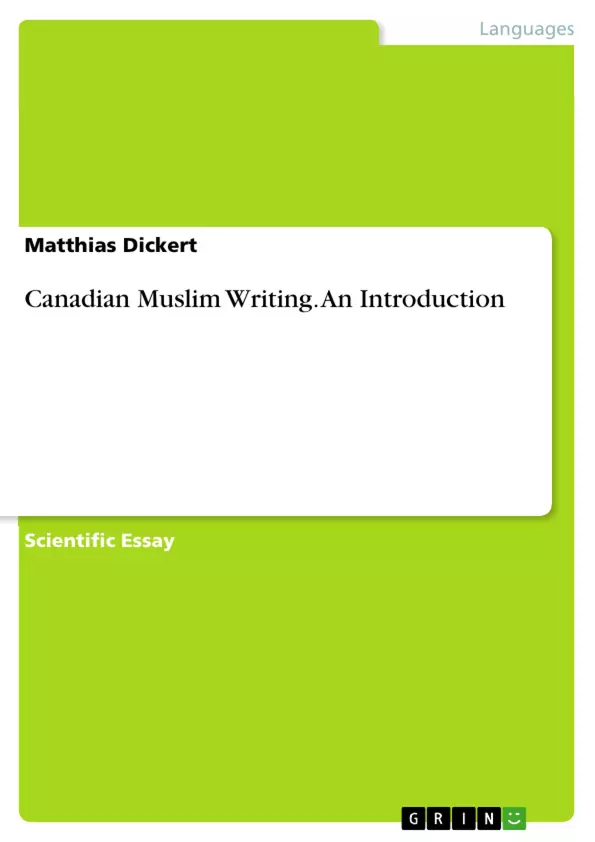In the past four decades the literary reflection of Muslim life in East and West has been characterized by the West with skewed perceptions of Islam and Muslim existence.
The events of 9/11 and its aftermath have worsened the traditional negative and stereotyped perception and treatment of Islam. The consequence from this was a negative treatment of Muslim existence by Western and Muslim writers alike. Many novelists disposing of a Muslim background were and (still) are trapped in the negative notion of 'the clash of civilizations' which is so often embedded in many novels be it in the presentation of the characters or simply a negative portrayal of the Muslim world.
In contrast to many migrant writers with a British background who are labelled in terms such as 'Postcolonial', 'Migrant Writing', 'British Muslim Fiction', 'Muslim Narrative Writing' or 'Muslim Writing' American and Canadian based Muslim writers face a harder position since they are (historically, culturally and literarily speaking) not that deeply established as their British counterparts. This is partly due to the fewer number of writers and the shorter period of their literary presentation and a (logical) shorter literary tradition resulting from this.
Open questions emerging from this here are if critics and readers alike see Islamic English literature as being literature written by Americans or Canadians or if it is basically Muslim or Islamic?
It goes without saying that fiction is not only a reflection of reality but also a mode of tearing down the above mentioned stereotypes of Muslim existence as such. It is interestingly speaking matters of identity which function as key elements of 'Muslim Writing' in Britain, America and Canada a clear indication for the fact that treatment and representations of Muslims have not only been neglected so far but also offer a wide field of possibilities.
Inhaltsverzeichnis (Table of Contents)
- Foreword
- Contemporary English Speaking Literature and the Role of Muslim Writers
- Contemporary Muslim Writing
- Canadian Muslim Writing
- Outlook Canadian Muslim writers
- Conclusion
Zielsetzung und Themenschwerpunkte (Objectives and Key Themes)
This book explores the development and significance of Canadian Muslim writing within the broader context of contemporary English-speaking literature. It examines the challenges faced by Muslim writers in navigating cultural and literary landscapes shaped by Western perceptions of Islam and Muslim identity.
- The impact of Western stereotypes and biases on representations of Muslim life in literature
- The unique position of Canadian Muslim writers in comparison to their British counterparts
- The role of religion as a central theme in contemporary Muslim writing
- The intersection of identity, immigration, and cultural integration in Muslim narratives
- The potential for Muslim writing to challenge and deconstruct existing stereotypes.
Zusammenfassung der Kapitel (Chapter Summaries)
- Foreword: Introduces the book's focus on contemporary Muslim writing and its critical examination of Western perceptions of Islam and Muslim existence. It highlights the challenges faced by Muslim writers in presenting authentic and nuanced representations of their experiences.
- Contemporary English Speaking Literature and the Role of Muslim Writers: Discusses the broader context of Muslim writing within contemporary English-speaking literature, highlighting the influence of historical events such as 9/11 and the emergence of 'clash of civilizations' narratives. It also examines the distinct challenges faced by Muslim writers in America and Canada compared to those in Britain.
- Contemporary Muslim Writing: Explores the key themes and characteristics of contemporary Muslim writing, emphasizing the centrality of religion and its role in shaping identity, experiences, and narratives. It discusses the use of religion as a literary category and its potential to challenge existing stereotypes.
- Canadian Muslim Writing: Focuses specifically on the development and significance of Canadian Muslim writing, examining its unique perspectives and contributions to the broader literary landscape. It discusses the impact of immigration, integration, and cultural identity on the work of Canadian Muslim writers.
- Outlook Canadian Muslim writers: Discusses the future prospects and potential of Canadian Muslim writing, exploring its ability to continue challenging existing narratives and foster greater understanding and appreciation of Muslim experiences. It also considers the role of Canadian Muslim writers in shaping the future of contemporary English-speaking literature.
Schlüsselwörter (Keywords)
The key themes and concepts explored in this book include contemporary English-speaking literature, Muslim writing, Canadian Muslim writing, Islam, identity, immigration, integration, stereotypes, cultural representation, and the role of religion in literature.
Frequently Asked Questions
What is the main focus of "Canadian Muslim Writing"?
The book explores the development of Muslim literature in Canada and how writers navigate cultural landscapes shaped by Western perceptions and stereotypes of Islam.
How did the events of 9/11 affect Muslim literature?
9/11 worsened negative stereotypes, often trapping writers in the 'clash of civilizations' narrative, which influenced character presentation and the portrayal of the Muslim world.
What is the difference between Canadian and British Muslim writers?
British Muslim writers are more deeply established with labels like 'Postcolonial' or 'British Muslim Fiction,' while Canadian and American writers face a harder position due to a shorter literary tradition and fewer writers.
What role does religion play in contemporary Muslim writing?
Religion is a central theme that shapes identity, experiences, and narratives, and it is used as a literary category to challenge existing stereotypes.
Can fiction change the perception of Muslim existence?
Yes, fiction serves as a mode of tearing down stereotypes and offers a wide field for exploring neglected matters of identity.
- Citation du texte
- Dr. Matthias Dickert (Auteur), 2017, Canadian Muslim Writing. An Introduction, Munich, GRIN Verlag, https://www.grin.com/document/357331



